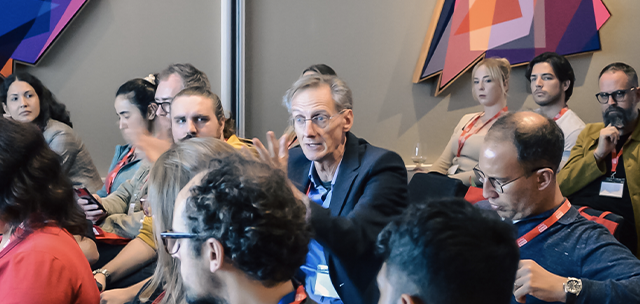Digital Skills Gap
The Digital Skills Debate: London Highlights
14 October 2022 • 3 min read

On the back of publishing extensive research into the nature of the UK’s digital skills gap, we invited London leaders and influencers to take part in an interactive panel debate.
The diverse panel delivered a multi-disciplinary perspective, featuring experts from Cloud, people-development, AND Digital’s award-winning Academy and the former CIO of John Lewis and British Airways. In the audience; we welcomed faces from across the industry, with financial services organisations like Pagonxt and FSCS, retailers like Ocado and digital training providers like iO Academy.
As the first in our #DigitalSkillsDebate series, the fresh data inspired some provocative and perhaps unexpected thoughts.
Digital skills means different things to different people
Panellists and audience members agreed that organisations need in-house skills like coding and application development, but that these “hard” technical skills are not enough. The key to success is the human ability to leverage digital knowledge.
Mairead O’Connor, Exec for Cloud Engineering at AND DIgital stated:
“Coding alone does not solve problems. Much broader skills that aren’t technical are needed to create success; such as teamwork, communicating with empathy, problem solving and inspiring others. We, as an industry, need to be aligned on what we mean by digital skills.”
The stigma of not having the right skills
“What blew my mind, listening to the panel, is that the education system isn't preparing people for being in work. They're teaching students to "do" the job, but not the practicalities of being in the position.”A passionate discussion occurred around a key data point: that 1 in 4 knowledge workers feel they don’t have the digital skills to do their job. They acknowledged that there's stigma and embarrassment around admitting to this, and that that in itself is causing a greater gap. If individuals' skills gaps aren't acknowledged or measured, they can't be closed. The audience agreed that C-Suite does not always see the on-the-ground impact of people not having sufficient digital skills.
Carl Banks from Axelerant, a digital experience design company shared his thoughts:
Two urgent actions were identified:
- Businesses need to build psychological safety in speaking about gaps in knowledge and skills, and need to foster a culture that actively promotes and supports learning at all levels.
- Entry level upskilling is critical in all aspects of digital, and businesses need to prioritise investing in this area.
Upskilling in organisations is limited to tech-specific roles
The research finding - that 2 out of 3 knowledge workers have never received digital upskilling from their employer - kicked off another heated debate. The big question being, why aren't organisations investing in equipping their teams with digital skills?
The conclusion: there is some digital upskilling, but it tends to be limited to those in technical roles.
The changes that attendees felt needed to happen are:
- Upskilling and training needs to be made more accessible to a wider number of people.
- Upskilling needs to be broader than hard tech skills.
- Upskilling at all levels of needs to become part of an organisation’s core strategy.
Advice for the education sector
When asked ‘what does business need from the education sector?’, the responses were consistent, and perhaps best summed up by Carl from Axelerant:
“There's no career you can go in to, from the creative industry to sports, where you can avoid the need for digital skills. They need to be as synonymous as maths, reading and writing in our education. That's how we'll close the digital skills gap for the future.”
They key points made were:
- Upskilling across all aspects of digital skills need to be started at a young age. Coding clubs in schools, placements in companies and even guest speakers from recent school leavers would all help.
- Companies should invest more in apprenticeships and equip those apprentices with digital skills.
- In recruitment, diversity needs to be a key focus - and not as a box ticking exercise. If organisations are to solve problems for today’s diverse society, they need a workforce that understands and represents its full breadth of needs and perspectives.
Our #DigitalSkillsDebate events have concluded for 2022, but you can still join the conversation on social, or head to our content hub to discover more opinions on our skills gap research.



